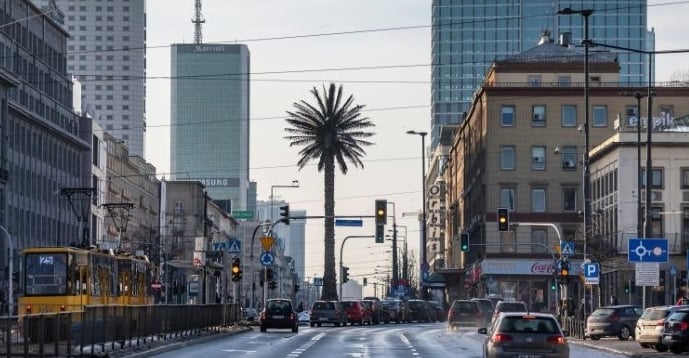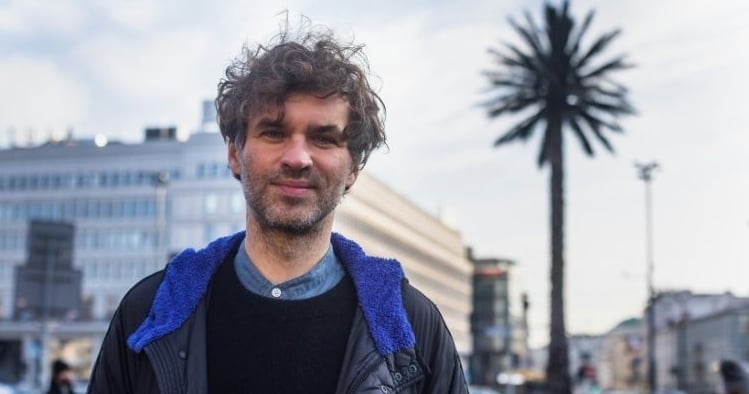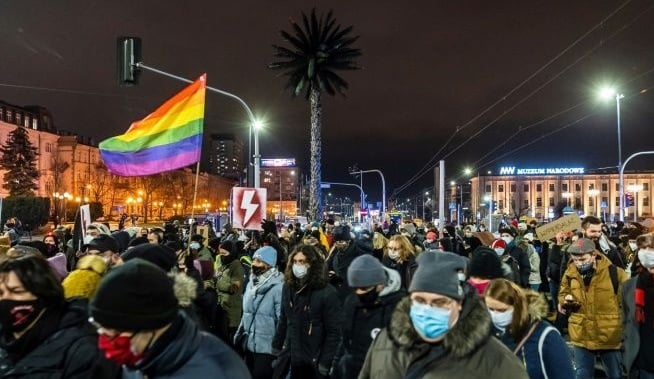
By Anna Maria Jakubek
WARSAW (AFP) — Tropical is not a word that springs to mind when talking about the grey Polish capital.
Yet, a palm tree towering over downtown Warsaw has firmly taken root in the city's landscape and affections — and is even a popular postcard landmark.
Standing aloft a busy central roundabout, the artificial tree began life 18 years ago as an art project and now provides an exotic rallying point for many a social cause.
It has donned a giant nursing cap in solidarity with protesting nurses, been turned into the Greek island of Lesbos for bikini-clad LGBT activists and had its leaves plucked off by anarchists.
Traffic police stationed on the roundabout are even nicknamed "Miami Vice" — a reference to the popular US cop show set in warmer climes.
Sebastian Cichocki, curator of the Museum of Modern Art which is the tree's guardian, said it may look "alien" and "like something that fell from the sky" but that was what captured imaginations and inspired people.
"The palm is a living object, a disobedient object. Not just an aesthetic artwork, but a generator of social energy… An object on which you can project your own daydreams, desires and fears," he told AFP.
The 15-metre (49-foot) tree is a convincing fake: its steel trunk is covered with real date palm bark and, while its leaves are made of metal and plastic, that has not stopped birds from nesting in the crown.

Story of loss
The project stemmed from a trip to Israel by Polish artist Joanna Rajkowska, who said she witnessed the "tension and fear" of the second intifada, or Palestinian uprising against Israeli occupation that began in late 2000.
"When I came back, what I felt was this overwhelming feeling that the Jews should simply be here (in Poland) in full prosperity and happy and this land should really be their home," she told AFP.
Before World War II, Poland had Europe's largest Jewish community but 90 percent died in the Holocaust and most of the rest left.
"The palm tree was created out of this vacuum. A really deep sorrow that we lost something," Rajkowska said, calling the tropical plant she saw around Israel "a sign of life".
Placed at the top of one of Warsaw's main thoroughfares — Jerusalem Avenue — the fake tree also drew attention to the local 18th-century Jewish community that gave it its name.

'Misfit'
The palm project, named "Greetings From Jerusalem Avenue", was also a social experiment to see how Poles would respond.
Faced with the exotic specimen where a Christmas tree used to stand every year, many residents grumbled that someone must have lost their mind — or "got hit by a palm tree" as the Polish saying goes.
"There was a real distaste, they were shocked," Rajkowska said, of the tree's naysayers.
"Especially the taxi drivers. They absolutely hated the palm tree… They were completely embarrassed by the misfit," she added.
The tree still has its critics, with one passerby calling it "useless garbage".
But it has grown on many in the city.
"I was surprised at first, but now I can't imagine the roundabout without the palm. It's cheerful, relaxing," pensioner Malgorzata Blaszczyk told AFP.
"It makes me think of vacation. That it'd be nice to finally, especially now, fly somewhere for similar views."
Dead leaves
Ad salesman Bartosz Macichowski recalls the sweltering summer when the palm's fronds were replaced with real drooping dead ones to call attention to climate change.
"It's nice that by altering its appearance the palm can show us whether things are going in the right direction. Like a social barometer," the 44-year-old told AFP.
One of the withered leaves is now part of a display near the palm, along with a huge nest discovered on its crown — and a stark environmental warning penned by the tree itself.
"Just think, tens of millions of years ago palm trees grew in Poland… They were thriving when you all were still squatting in caves!" it reads.
"Do you think about how your descendants will manage in, say, a few hundred years? In what air, what water, what temperature?
"Roll up your sleeves and get to work — otherwise you will lose the chance for survival."
ADVERTISEMENT
ADVERTISEMENT


































